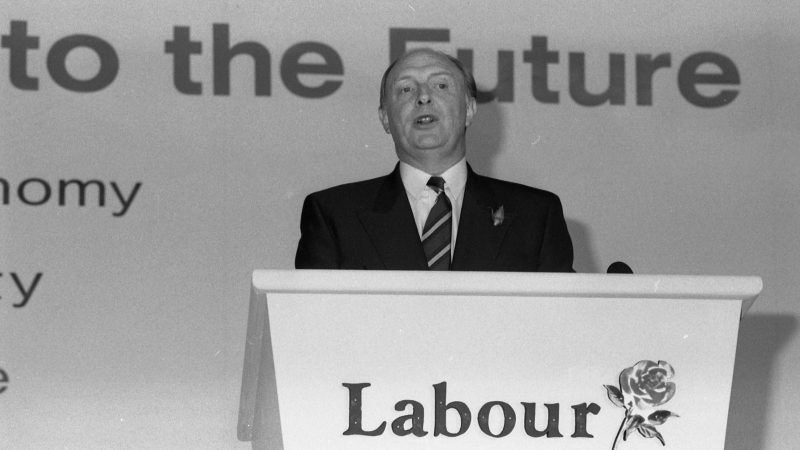
Neil Kinnock has urged the Labour Party to “face outwards and attack the real enemy and focus our attention and energies on that, rather than trying to prove our worth and earn our spurs by victories in internal battles”.
The former Labour leader addressed a Q&A session today, after the publication of a report by Labour in Communications earlier this week. He warned the party against trying to “communicate through the prism of our internal disputes”.
“There have always been people in the Labour Party – fortunately never a majority – who value power in Labour greater than power for Labour,” Kinnock told the audience.
“The only way to deal with them conclusively is for the great majority of those in the party to be so committed to democratic power for Labour that those whose struggles at whatever level become insignificant and therefore irrelevant.”
The former Labour leader’s comments today come after Labour’s national executive committee voted in July to proscribe four groups – Socialist Appeal, Labour in Exile Network, Labour Against the Witchhunt and Resist.
Militant was proscribed during Kinnock’s leadership of the party. Asked today whether Momentum should be proscribed in the same way, he said the move “would be much more difficult”.
Kinnock replied: “Momentum, by mixture of accident and design but I think mainly design, has avoided the errors of directly transgressing the constitution, which indeed I amended in the wake of the Militant experience in order to even more firmly guarantee due process and natural justice and to make the Labour Party more secure.
“They do not make the errors that Militant made. And, in any case, Momentum is not Militant. I heard the questioner describe them as “anti-Labour Party”, and I am sure there are people in Momentum who are malevolent towards the Labour Party as an organisation for all kinds of fancied ideological reasons and some personal ones.
“But I don’t think they are the significant people. I think the significant people are the ones who joined Momentum with the best intentions and for the best purpose of encouraging and indeed ensuring the radicalism of the Labour Party.”
He encouraged Momentum members and supporters to “think about why they really need to have a separate organisation” to the party, and whether their “hopes for transformation” would be better served by engaging in the mainstream.
Kinnock declined to offer the current party leader advice on his upcoming conference speech, which Keir Starmer has said will paint “in primary colours” the kind of country a Labour government under his leadership would champion.
“He will have to follow his own counsel, and obey his own instinctive judgments, and be conscious of the case he needs to make and the way in which he needs to make it,” Kinnock said.
“He is a very experienced and very able, recognised advocate and inquisitor – that was his role, as a widely applauded and admired senior barrister, and he’s got the kit. So I wouldn’t tend him any advice.”
The session this afternoon followed the publication of the Fit for the Future report, in which the Labour leadership was advised to make fewer policy announcements. Kinnock suggested today that the ten pledges made by Starmer in his leadership campaign last year could be streamlined.
“Ten was good enough for Moses, but maybe six – if you are really trying to ram home central messages, maybe six is enough. It is quite probable, of course, that the ten could – without any loss at all of impact or impetus – be turned into six,” he said.
“If people examine texts closely they will find that their adequate 20-word sentences or paragraphs – and this comes from the Welsh windbag, by the way – could serve the purpose of clarifying and simplifying the Labour Party central messages without being patronising or evasive. I think it’s quite possible to do that.”
The 26-page paper published by Labour in Communications, with a foreword from Kinnock, made 22 recommendations in total, divided into those related to policy, social and digital, delivery, broadcast and print, the shadow cabinet and “brand”.
The group highlighted that Labour has announced over 200 non-Covid related policies since Starmer became leader, and argued that “simply announcing fewer policies would ensure that the ones they do announce would get more cut through”.
“The party announces one policy and before it has finished announcing it, it has moved on to another, without linking the two together,” the report read.
The authors urged the Labour leadership to focus on answering the question “Why are you in politics and what are you setting out to achieve?”. The report added that a “wider narrative will stem from there”.
Labour in Communications, founded earlier this year, is a network of around 1,200 Labour Party supporters working in corporate communications, public relations, public affairs and government relations sectors. Its report includes input from former and current Labour MPs, local councillors and advisers to the party.




More from LabourList
Ex-Cooper aide: ‘Keir’s ground-breaking deal with France suggests his migration approach could be bearing fruit’
Labour to scrap first past the post for mayoral and PCC elections
New intake Labour MPs: ‘Why we set up the Living Standards Coalition’